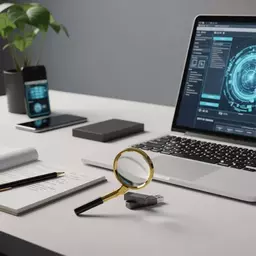Surveillance Laws for Private Investigators

Posted on: 2025-10-19
By: Clara Ashford
In the field of private investigations, understanding the legal boundaries is not just crucial; it is essential for maintaining integrity and trust. The stakes are high, and the laws regulate every aspect of surveillance. What are the key components that every investigator should grasp to stay compliant and effective?
What You Will Learn
- The importance of the Privacy Act 1988 in protecting personal information during investigations.
- Key provisions of the Surveillance Devices Act 2004, including the necessity of obtaining consent for surveillance activities.
- Understanding the limitations placed by the Telecommunications (Interception and Access) Act 1979 on communication interception.
- The roles of regulatory bodies like the OAIC and AFP in ensuring compliance with surveillance laws.
- The distinction between legal and illegal surveillance practices and the potential consequences of non-compliance.
- Best practices for maintaining ethical standards and transparency in investigative work.
Legal Framework for Private Investigations in Australia
Understanding the key legislation and regulatory bodies is crucial for compliant surveillance practices.
Key Legislation
- •Privacy Act 1988: Regulates personal data collection, use, and disclosure.
- •Surveillance Devices Act 2004: Addresses surveillance device usage and consent.
- •Telecommunications (Interception and Access) Act 1979: Restricts communication interception.
Regulatory Oversight
- •Office of the Australian Information Commissioner (OAIC): Ensures Privacy Act compliance.
- •Australian Federal Police (AFP): Enforces telecommunications interception laws.
- •State Regulatory Authorities: Oversee Surveillance Devices Act compliance at local levels.
Legal Surveillance Examples
- ✓Physical surveillance in public spaces.
- ✓Electronic surveillance with prior consent.
- ✓Digital surveillance techniques compliant with the law.
Illegal Surveillance Practices
- ✗Trespassing on private property.
- ✗Unauthorized recording of individuals.
- ✗Interception of communications without legal authority.
Understanding the Legal Framework for Surveillance in Private Investigations
As a seasoned private investigator at TC Forensic Investigations, I understand that navigating the legal landscape for surveillance is crucial. Whether you are working on a corporate assignment or a personal case, knowing the legal frameworks is essential to ensure your investigative practices remain compliant. In Australia, key legislation governs the operation of private investigators, and it's vital to familiarize yourself with these laws.
The Privacy Act 1988, Surveillance Devices Act 2004, and the Telecommunications (Interception and Access) Act 1979 are crucial instruments that outline what is permissible when conducting surveillance. Understanding these acts not only protects you legally but also upholds the high standards of integrity that TC Forensic Investigations is founded upon!

Overview of Key Legislation Impacting Private Investigators in Australia
- Privacy Act 1988: This act regulates how personal information is collected, used, and disclosed. It emphasizes that individuals have a right to privacy, which investigators must respect.
- Surveillance Devices Act 2004: This legislation specifically addresses the use of surveillance devices, outlining what types of monitoring are allowed and requiring consent in many cases.
- Telecommunications (Interception and Access) Act 1979: This act restricts the interception of communications, including phone calls and emails, without appropriate legal authority.
Familiarizing yourself with these laws ensures that your investigative work remains ethical and within legal boundaries. As I always emphasize to my team, understanding the legal landscape is not just about compliance; it's about maintaining our reputation as trustworthy professionals!
Key Regulatory Bodies and Their Oversight Role
In the realm of private investigations, several regulatory bodies oversee the enforcement of surveillance laws. The principal organizations include the Office of the Australian Information Commissioner (OAIC), the Australian Federal Police (AFP), and various state-level authorities.
- Office of the Australian Information Commissioner (OAIC): This body ensures compliance with the Privacy Act and provides guidance on handling personal information.
- Australian Federal Police (AFP): The AFP plays a crucial role in enforcing laws related to telecommunications interception and conducts investigations into breaches of surveillance laws.
- State Regulatory Authorities: Various state bodies also oversee compliance with the Surveillance Devices Act, ensuring local adherence to the regulations.
Understanding the roles of these regulatory bodies can help you navigate the complexities of surveillance laws effectively. At TC Forensic Investigations, we strive to maintain transparency and integrity in all our dealings. Being informed about regulatory oversight allows us to serve our clients with confidence! For more insights into how these regulations impact various investigative techniques, consider exploring surveillance techniques used by investigators.

What Constitutes Legal vs. Illegal Surveillance?
As private investigators, it’s essential to distinguish between what constitutes legal and illegal surveillance. Legal surveillance encompasses activities that are conducted within the framework of the law, such as obtaining consent before recording and using surveillance devices appropriately. Examples include:
- Conducting physical surveillance in public spaces.
- Using electronic surveillance with prior consent.
- Employing digital surveillance techniques that comply with the law.
On the other hand, illegal practices can severely damage your reputation and your practice. Activities like trespassing on private property or unauthorized recording are clear violations of the law. Understanding these differences is not just a matter of legality; it’s about safeguarding the trust that clients place in us as investigators.
We Want to Hear From You!
As private investigators, how do you ensure that your surveillance practices remain compliant with legal standards? Share your strategies or challenges below:
Frequently Asked Questions (FAQs)
- Q1: What are the key Australian laws governing private investigations?
- A1: The primary laws are the Privacy Act 1988, Surveillance Devices Act 2004, and the Telecommunications (Interception and Access) Act 1979.
- Q2: Which regulatory bodies oversee private investigators in Australia?
- A2: Key bodies include the Office of the Australian Information Commissioner (OAIC), the Australian Federal Police (AFP), and various state regulatory authorities.
- Q3: What types of surveillance are considered legal?
- A3: Legal surveillance generally includes physical surveillance in public spaces, electronic surveillance with prior consent, and digital surveillance techniques compliant with relevant laws.
- Q4: What actions are considered illegal surveillance practices?
- A4: Illegal practices include trespassing on private property, unauthorized recording of individuals, and interception of communications without legal authority.
- Q5: Why is ongoing education important for private investigators?
- A5: Ongoing education ensures investigators stay updated on legislative changes and best practices, maintaining compliance, protecting their reputation, and upholding ethical standards.
Summarizing Key Legal Takeaways for Private Investigators
In the landscape of private investigations, understanding the legal framework is vital. As a seasoned investigator at TC Forensic Investigations, I've seen firsthand how crucial it is to grasp the essential legislation that governs our work. This encompasses the Privacy Act 1988, the Surveillance Devices Act 2004, and the Telecommunications (Interception and Access) Act 1979. Each of these laws plays a significant role in shaping our daily operations and ensuring that we respect individual privacy while conducting thorough investigations.
Moreover, it's essential to consider the regulatory bodies like the Office of the Australian Information Commissioner (OAIC) and the Australian Federal Police (AFP), who oversee compliance. Their directives help us navigate the intricacies of legal surveillance, ensuring we maintain ethical standards while protecting our clients’ interests.
- Familiarize yourself with the Privacy Act to understand personal data protections.
- Always comply with the Surveillance Devices Act to avoid illegal surveillance practices.
- Stay updated on the Telecommunications Act to ensure lawful communication interception.
- Engage with regulatory bodies for guidance and support regarding compliance.
By keeping these key takeaways in mind, private investigators can operate within the legal boundaries while providing exceptional service to clients.
Encouraging Responsible Surveillance Practices
As private investigators, our responsibility extends beyond just gathering information; it includes adhering to legal guidelines and prioritizing ethical practices. At TC Forensic Investigations, we believe that a proactive approach to compliance is essential for our credibility and long-term success. I urge all investigators to commit to ongoing education and stay abreast of legislative updates that may impact our practices.
Here are some actionable steps we can take to promote responsible surveillance:
- Participate in regular training sessions focused on legal updates.
- Establish clear internal policies that outline ethical surveillance practices.
- Seek guidance from professional organizations like the Australian Professional Investigators Association (APIA).
- Encourage open communication with clients about surveillance procedures and legal boundaries.
By embracing these practices, we not only protect ourselves but also enhance our professional reputation. Let's champion responsible surveillance together! For further reading on related topics, consider our article on digital forensics in fraud detection.
Recap of Key Points
- Familiarize yourself with the Privacy Act 1988 to understand personal data protections.
- Always comply with the Surveillance Devices Act 2004 to avoid illegal surveillance practices.
- Stay updated on the Telecommunications (Interception and Access) Act 1979 to ensure lawful communication interception.
- Engage with regulatory bodies like the OAIC and AFP for guidance and support regarding compliance.
- Commit to ongoing education and training to stay informed about legal updates affecting private investigations.
 In a world where cyber threats are constantly evolving, the need for effective digital forensics has
In a world where cyber threats are constantly evolving, the need for effective digital forensics has
 Understanding the nuances of synthetic identity fraud is essential in today's digital age. As frauds
Understanding the nuances of synthetic identity fraud is essential in today's digital age. As frauds
 In the competitive landscape of corporate investigations, the choice of a private investigator can m
In the competitive landscape of corporate investigations, the choice of a private investigator can m
